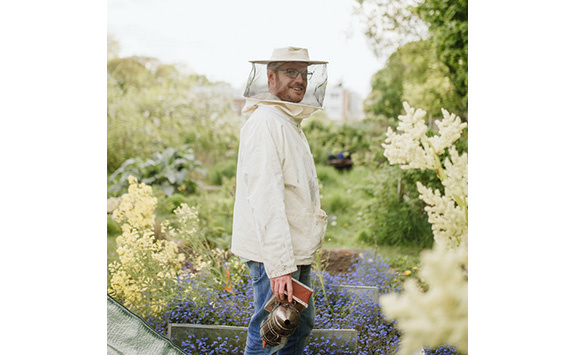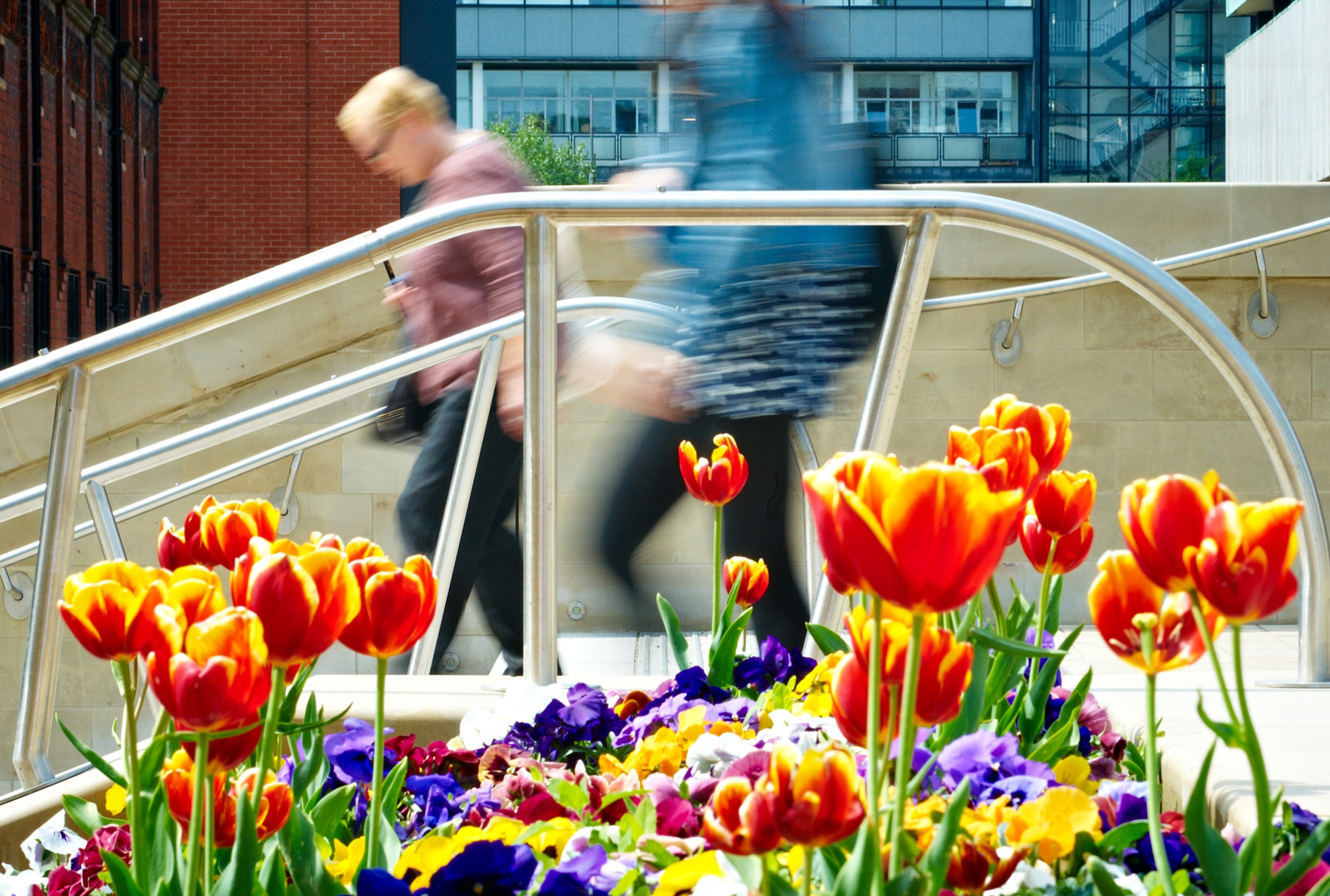Adapting to Tomorrow: Geospatial Insights into Building Climate Change Resilience
Written by Jelaine Gan and Sheena Davis
4 June 2024
In a wrap
- Dr Alistair Ford's research uses geospatial modelling to analyse climate impacts on urban environments, providing spatial tools to inform policymakers and urban developers.
- Combining scenarios of climate change, socioeconomic change, population growth and use change helps pinpoint areas vulnerable to climate change impacts.
- Addressing climate change effectively requires collective action from governments, stakeholders, and the public.
Understanding how the impacts of climate change intersect with urban systems, like land use and transport, is crucial for developing strategies for climate change adaptation and building resilience within communities.
Dr Alistair Ford is a senior lecturer in Geospatial Data Analytics in the Geospatial Engineering group based at Newcastle University. He is also a member of the Tyndall Centre for Climate Change Research. His research explores climate impacts, such as flooding events and extreme temperatures, on urban land use and transport systems through geospatial modelling. He works to deliver spatial tools that can help policymakers, urban developers and stakeholders make informed planning decisions.

Adaptation and strengthening capacities
Alistair’s research focus closely aligns with the CCER’s research themes that centre around adaptation to extreme events and strengthening capacities. His multidisciplinary work brings together spatial data from a range of different fields. As he puts it, “as a geospatial person, you’re like the glue. Everyone has spatial data, and they all have their individual scientific fields that they're working in, but quite often what we do as spatial people is join it all together because it's about the same place, but completely different topics.”
Bringing together scenarios of climate change, socioeconomic change, population growth and land use change will allow us to identify and understand areas at risk due to climate change associated impacts. This gives us the opportunity to find the best adaptations and mitigations against these risks and subsequently strengthen community capacity to withstand climate impacts. In Alistair’s most recent project, OpenCLIM (Open Climate Impacts Modelling framework), he and his team used GIS (Geographic Information Systems) to combine flood models and/or heat models with urbanisation and population models to pinpoint where the spatial hotspots of risk may occur in the future.
Moving forward, Alistair is working on a project that will look at further developing an agent-based transport model which will explore climate impacts in the urban environment and how this will affect human movements within that urban setting. This will help us in understanding how different social groups are affected by extreme events, such as flooding and heatwaves. As Alistair explained, “Different social groups have contrasting mobility patterns, for example, people at different life stages go to different places and have different travel needs. When you have an extreme event, certain social groups are impacted differently to others.”
Cultivating engagement
Addressing environmental challenges requires collective participation from governing bodies, stakeholders, and the public, therefore the cultivation of engagement should be prioritised. By raising awareness and understanding through research and encouraging participation at all levels, it is possible to drive informed action.
Alistair is very much a believer in research for a purpose and consistently works to connect and collaborate with people both within and outside of academia on the issues surrounding climate change and finding solutions that develop community resilience and adaptability. He works with local authorities such as Newcastle City and Gateshead Councils, helping them to think about how they could incorporate models and data to develop future land use plans, and collaborates with Active Travel England, looking at scenarios for increasing walking and cycling in England. He also works with the Department for Transport on a new resilient transport hub (DARe – Home - DARe) and how to ensure their future plans for decarbonisation are also able to withstand future climate change.
However, it’s not all government bodies that Alistair collaborates with. He currently sits on Newcastle’s Culture Compact, Newcastle Creates, which brings together cultural organisations to discuss the role of culture in the city. He leads the theme exploring the links between culture and climate change in the city. He has also been involved in a recent play on climate change co-developed with local theatre group Cap-a-Pie called ‘Climate Change Catastrophe!’, which went on to win a Green Gown Award and was presented at COP26 in Glasgow. From hosting science debates to taking part in the Newcastle Youth Climate Summit, Alistair does not shy away from any opportunity to facilitate engagement and cooperation. The way he sees it, there are a multitude of ways to connect with and inspire different groups of people. He encourages people to make use of all the different opportunities to engage and get talking about these important climate issues that we are all faced with.
Researcher’s voice
For this section, let’s hear directly from Alistair.
What has your journey been to this point? Have there been any major challenges along the way?
“Well, in terms of the challenges, I'm a working-class kid from Washington, Tyne and Wear. I'm the first person to go to university in my family. So, coming to university as a kid from a comprehensive school, it was quite a steep learning curve to understand what's going on and how all this works. I did my undergraduate degree in Geographic Information Science here in 1998 and I've been here ever since. I was offered to study for a PhD straight after my undergraduate, which I started in 2001 but then never really finished. I started doing extreme rainfall research in 2005 and then just found my way by accident into the world of climate change. So, I just found myself working on these big multidisciplinary research projects with lots of people from all kinds of scientific backgrounds. Then I became part of the Tyndall Centre, which opened my eyes to climate change and the fact that actually having GIS skills and mapping skills is quite useful in that world.
I finally got a PhD by published works in 2019, 18 years after I started. So, it’s been an unusual journey, but I think because I've had lots of different avenues, I find myself now being much like a generalist. I'm not really an expert in any single one, but I think just knowing lots of different things helps me to see the bigger picture which is quite useful sometimes.
I think that being an interdisciplinary researcher is a challenge as well. It takes a lot of time to understand how you work in these kinds of spaces with lots of different scientific backgrounds and with stakeholders. It doesn’t necessarily come naturally, everyone has got their own language, their own jargon, their own worldview, and their own discipline. So, you’re often thinking what does that mean and what does that term mean to you, as it doesn’t mean the same to me. So that in itself is not necessarily straightforward, but it's very rewarding when you get it right.”
What are your predictions for your field in the future?
“Well I won’t make a prediction, the future is complex and uncertain, we don't know what it's going to be, but what models can do is give you potential scenarios of the future to explore. You can have the horrible Mad Max type of scary future scenario or you can have the utopian green future scenario and then you say, OK, the impacts of this one are that, and the impacts of this one are that, which one you want? So, you give people information to make the choice.
However, I don’t think we’re going in the right direction; I think I am increasingly worried that we're just talking about stuff and not doing anything. I see this problem everywhere. There's a lot of talk about things like ‘net zero’, but there’s not enough action. We’re headed for temperature increases where adaptation becomes much more difficult. Impacts become much greater. But at the same time, I think there's been a big awakening in the public in the last few years, which does give me some hope and positivity, and while it will be hard, my hope is that the more we talk about it, the more we get out and try and inspire people, especially young people, something might happen.
I think that we’re in a world of massive inequality. Those of us in the West generate huge amounts of carbon emissions for fairly frivolous things, like jetting off on holiday five times a year. And then there's a huge majority of people in the Global South, who have tiny carbon footprints compared to ours and are still suffering all the impacts. Those people are not going to sit and take it forever, are they, when their livelihoods and their way of life and their ecosystems are slowly disappearing? So, you know, we either need to change our ways or someone's going to make us change.
And I think for me, I'm very much a believer in that I must walk the walk as well as talk the talk, so I avoid flying unless I absolutely have to. We know it’s more important to think about systemic change than individual actions, but I think I just need to send that signal. And I think those of us in the know must really demonstrate that we care about this thing and that we use the knowledge of how scary it is and how big it is to change our own lives. Because if we don't change our lives, how can we expect other people to do it?”
